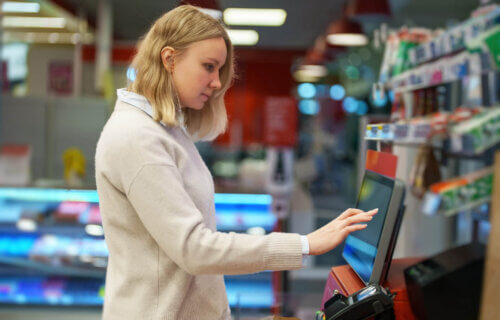PHILADELPHIA — Automatic checkouts in supermarkets may decrease customer loyalty, especially for those with larger shopping loads, a new study suggests. Customers using self-checkout stations often feel overwhelmed and unsupported, missing the assistance traditionally provided by store staff. Researchers say this lack of personal interaction can negatively impact their perception of the supermarket.
While many stores have adopted self-checkout systems for their speed, ease, and cost-efficiency, this convenience might not translate into a stronger connection with the store for the customers.
The research, conducted by a team from Drexel University, is pioneering in its exploration of this topic. It reveals that the perceived simplicity of the checkout process and the feeling of being left to manage on their own are key factors in understanding the impact on customer loyalty.
The study also finds that the number of items a customer purchases influences how the type of checkout affects their loyalty.

“Our findings indicate that self-checkout systems, despite their advantages in terms of speed, ease of use, and cost reduction, can result in lower customer loyalty compared to regular checkout systems, especially when the number of purchased items is relatively high (e.g., more than 15 items),” explains Dr. Yanliu Huang, an associate professor at the LeBow College of Business, in a media release.
In a series of five studies, the research team demonstrated that customers are more likely to remain loyal to a grocery store when they use regular checkout services. This loyalty is reflected in their increased likelihood of returning to the store in the future.
The additional effort required at self-checkout stations, along with the necessity to purchase bags and the expectation of store-provided service, were identified as factors that diminish loyalty.
“We found that when customers were encouraged to think of the extra effort involved in self-checkout as a rewarding experience, their perceived loyalty to the store was similar to those of regular checkout shoppers. For example, to overcome the negative impacts of using self-checkout on customer loyalty, retailers should attempt to make the self-checkout experience more rewarding, like encouraging shoppers to think the extra effort involved in self-checkout is a rewarding experience,” adds Dr. Huang. “Doing so offers retailers a solution to improve their self-checkout customers’ overall shopping experience, which in turn will facilitate higher customer loyalty.”
The study is published in the Journal of Business Research.
You might also be interested in:
South West News Service writer Jim Leffman contributed to this report.




If you like it better to have someone check and bag your groceries rather than have self-checkout, then don’t complain when prices increase because employers are having to hire more workers and pay them higher wages.
If you think they reduce prices when you use self-checkout that’s a claim that does not bear out.
Not accepting cash is illegal. I would immediately contact management and let them know it.
I hate the self checkout. It makes me mad to have to check stuff out … and then if you want to buy alcohol ( which I rarely do ) you have to call the clerk over and show them ID and then they have to check off some button or something.
They don’t give you enough space, and the robot voice is always yelling at you.
If you buy something without a tag on it you have to call the clerk over for a price check.
Then in these days of diseases you you are stuck in a line and a pen too close to all the people self-checking out.
I never use self-checkout.
And we need jobs for people.
The should outlaw self-checkout.
I am physically incapable of using the machines. I won’t go to a store that forces me to cash out like that.